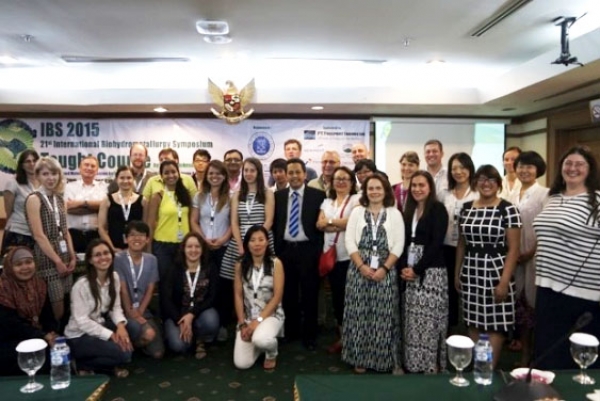IBS 2015 Report Back


The presenters and participants of the 2015 IBS taught course
IBS 2015 Conference Report Back
Written by Rob Huddy
Prof. Sue Harrison and Dr. Rob Huddy recently attended the 21st International Biohydrometallurgy Symposium (IBS) in Bali, Indonesia. The conference began with a one day taught course, “Cultivation and molecular techniques for isolating, cultivating and identifying extreme acidophiles”. The course was run by Dr. Barrie Johnson and Dr. Raquel Quatrini, and covered practical approaches and molecular techniques for studying acidophilic bacteria and archaea associated with biomining. Attending the taught course was a highlight of the conference.
The presenters and participants of the 2015 IBS Taught Course.
The symposium began in the evening, after the taught course, with a fantastic inaugural address by Prof. David Holmes that was entitled, “Navigating the Genomes-to-Ecosystems Cascade in Biomining Environments”. The gala dinner followed the keynote address, and the conference participants were entertained by a series of traditional food accompanied by Balinese dancers and musicians. The conference comprised two parallel scientific sessions, with invited keynote addresses at the start of each session. In addition to the oral sessions, there were two formal poster sessions held in the evenings. The poster sessions took place with a fantastic view of Sanur Beach and ocean. The daily keynote addresses, included those by Jan van Niekerk (Biomin, South Africa), Dr. Ricardo Amils (Spain) and Mariekie Gericke (Mintek, South Africa). CeBER was well represented across the scientific programme. Dr. Huddy presenting an oral (Analysis of the Biofilm Microbial Community Associated with a Bioprocess System for the Bioremediation of Thiocyanate-laden Mine Water Effluents), while Prof. Harrison presented two orals and a poster.
CeBER presented three oral papers, including a paper by Rob Huddy describing our on-going efforts to use metagenomics to characterise the microbial community associated with a thiocyanate bioremediation system, and a poster.
The conference closed with a vote, by the attendees, for the award IBS 2019 to Japan and a presentation by the 2017 hosts, Germany, describing and advertising for the planned conference. A social programme followed for the rest of the day and included a visit to Uluwato and a Kuta Beach restaurant. At Uluwato we were treated to a performance of a very entertaining traditional dance, with a view of the setting sun and the temple.
Attending the conference was a great success, with our on-going research in the field of biohydrometallurgy being well received by the conference participants. Dr. Huddy would like to acknowledge the financial assistance of the South African National Research Foundation, through the Research Career Advancement Fellowship programme, for the opportunity to attend this conference.
